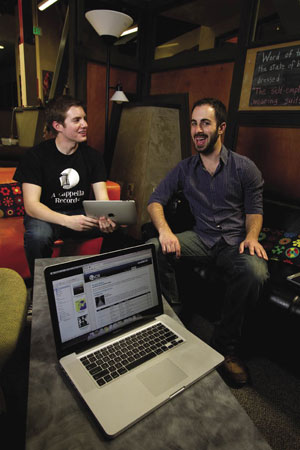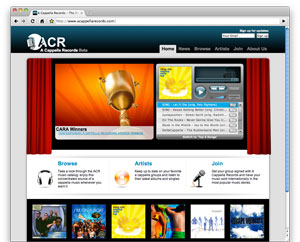It's one thing to have a pipe dream about starting your own business. It's quite another thing to pitch a business plan in front of seven veteran entrepreneurs and keep your cool while they pepper you with tough questions.
"Tell us about your data design. What is your feel for what the whole adaptation curve will be like? How international is this going to be? What exactly do you need to get started?"
Such questions leave zero room for fibbing, flubbing, or bluffing. But Chris Crawford, 23, and Jesse Avshalomov, 26, two founders of A Cappella Records, seemed unflappable on Friday at the second-annual UC Santa Cruz Business Plan Competition, open to current UCSC undergrads, graduate students, and recent graduates. Together they pitched a slickly detailed plan that nabbed the top $12,000 prize, which also includes professional services and work space.
A Cappella Records--which champions, promotes, and distributes the music of edgy all-vocal ensembles--plans to spend the money on a licensing database, a new web site with storefront, and market research.
The runner-up prizewinner was Danger Barrel, a digital-based trading card game company whose founders got $2,000 in start-up money. Last year's winner was Jackie Olin, a 2008 UCSC graduate who founded an organic baby food company called Sustainabites but is now taking some time off to focus on her new baby.
While some presenters stumbled over their notes, A Cappella Records--which bested 29 other competitors, including four semifinalists on Friday--seemed unflappable, and knew how to work a crowd. Crawford and Avshalomov, who come from performing backgrounds, took the podium while an all-vocal rendition of the Doobie Brothers' 1971 hit "Listen to the Music" thundered through the sound system.
Last year A Cappella Records vied for the same prize in this student-run competition, only to get knocked out in the final round. Undeterred, they launched the business anyhow. "We planned to do this anyway before we even heard of the business plan competition," Crawford said.
Nonchalance aside, the founders left nothing to chance this time. Cleverly, and with no prompting from the judges, they threw a bone to hypothetical skeptics who might wonder about the limitations of a "niche" vocal music market. In response, they mentioned the phenomenal success of Fox's a cappella-centric comedy show Glee, whose cast is embarking on a widely hyped summer tour.
They also pointed out the fact that their most popular current offering--the UCSC-based Acquire A Cappella's literal-minded cover of The Lonely Island's hilariously foul-mouthed yachting anthem "I'm On A Boat"--scored 1.36 million hits on YouTube.
Crawford and Avshalomov also mentioned the success of Oregon-based a cappella performers On The Rocks, whose all-vocal cover of Lady Gaga's smash hit "Bad Romance" is set to be released on MP3 this week. It will be available for sale on iTunes and promoted on the A Cappella Records web site.
A Capella Records sold more than 15,000 downloads since its launch a year ago and reports constant growth--all the more impressive considering Crawford is still in school, wrapping up his double major in business management economics and music this June. Avshalomov has just finished up his master's in vocal performance.
"How to find time to do this?" Crawford said. "Oh, it's tough, but when there's something you love to do, you make the time."
All of this made a big impression on the judges, including keynote speaker Carl Wescott, founder of Unexpected Development, who completed his master's degree and Ph.D. classwork at UCSC.
"The presentation was great," Wescott said. "The graphics, the music that started it, the slides. Chris Crawford has a passion for what he is doing, and that captivates listeners and potential investors."
Wescott, a former tech entrepreneur who is now a real estate developer, said he hopes the competition expands its scope to the point where UCSC becomes very well known for its blend of academics and industry.
"Think of the ecosystem built up around Stanford, a well-oiled machine that helped all these businesses emerge, like Yahoo and Google. We are coming from a standing start--this is only our second year--but how do we replicate what has been done elsewhere in the Bay Area and foster a culture of entrepreneurship within our community?"
He was also impressed by the fact that A Cappella Records needed more money just to handle an increase in responsibilities due to its growth. "That's a great and rare problem when you are an investor," he said.
UCSC economics professor Nirvikar Singh, an informal adviser and "general helper" to the contest, said that he would love to see the top two competitors in future competitions move on to regional, national, and international business plan competitions to expand the scope and the reach of the program.
"We have enough talent here to really compete at the global level," Singh said. "The tragedy is that so many people live in Santa Cruz for the beauty and commute over to Silicon Valley. There's no reason we can't get all these people doing all these wonderful things over here."
A Cappella Records hopes to become one of those homegrown successes. On Friday, the founders boldly situated themselves as part of music history by name-dropping such legendary record labels as Motown and Chess.
In spite of these comparisons, A Cappella Records is not a record label, nor does it have ambitions to be one. In exchange for a fee, it handles the licensing and distribution of vocal performances for a cappella groups--many of them collegiate groups doing counterintuitive covers of popular songs--and royalty payments for digital sales. The company also helps budding artists find their way through the byzantine world of the Internet marketplace.
A Cappella Records expects its song catalogue to double by the end of the year. That's why they are grateful for prize money to fund a large licensing database.
"Suddenly we have all these songs to keep track of, and most of them are not licensed to just one particular publisher," Crawford said. "It's very complex. We make sure that no song flies out under the radar without current licensing because of the legal risks."
Part of their job is to make sure the original artists--and the a cappella cover artists--get paid their fare share. For instance, the compensation to Lady Gaga is 9.1 cents per download for a cover version of her song. The glee clubs also get paid.
"I don't know of any collegiate a cappella group that pays its members,'' Crawford said. "But the money is used for group opportunities. It can help them go out on tour."
Related link:
Student finalists pitch business plans in quest for $12,000 in funding
Upcoming a cappella events
- Acquire A Cappella is hosting UCSC's largest a cappella event this Friday and Saturday:
May 28 and 29, 2010
8 p.m.
Stevenson Event Center
$5 general, $3 non-UCSC students, free for UCSC students.
- A Cappella Records' latest professional artist, the House Jacks, are performing at the Kuumbwa Jazz Center with Acquire on Friday, June 11. Information




